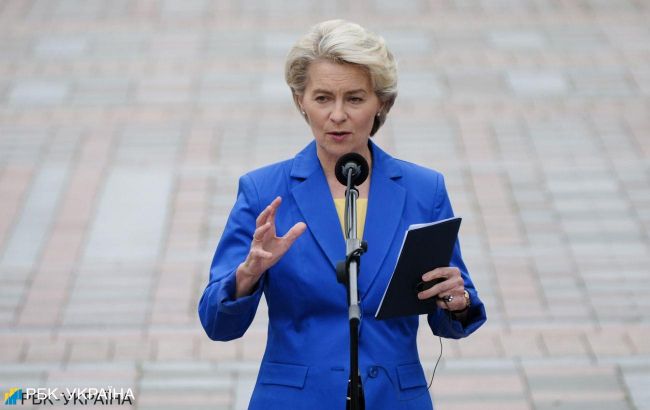Head of European Commission offers to grant Ukraine EU membership - Bloomberg
 President of the European Commission Ursula von der Leyen (Vitalii Nosach, RBC-Ukraine)
President of the European Commission Ursula von der Leyen (Vitalii Nosach, RBC-Ukraine)
European Commission President Ursula von der Leyen will deliver her State of the Union address today and emphasize how fundamentally Russia's war against Ukraine has changed the bloc, Bloomberg reports.
Sources familiar with the course of the negotiations reveal that Von der Leyen told EU ambassadors earlier this month that the bloc needs to expand its borders to acknowledge the new geopolitical realities, according to people familiar with talks. She said Ukraine and Moldova will need to be granted accession to prevent them from coming under the influence of countries that don’t share the bloc’s values.
Those two nations as well as others that have applied to join the EU – including five of the Western Balkan countries that are candidates – need to accelerate reforms to align with the bloc’s rules to take advantage of the political support that exists to add new members, said the people who asked not to be identified because the discussion was private.
For the 65-year-old bloc, these debates means drilling down to its core identity, as member states grapple with concerns over the ongoing war in Ukraine and competing with China and the U.S. economically and technologically, even as many start to fret about Donald Trump’s possible comeback.
It is expected that in October, the European Commission will announce whether it recommends initiating official accession negotiations with Ukraine and Moldova.
In the coming months, the 27 member states will decide on other crucial matters, including whether to cooperate more closely on defense and military issues, how to fund their common goals, and whether they should become more flexible in the decision-making process, as stated by EU officials and diplomats.
The price of membership
Some countries fear that absorbing a war-torn Ukraine would spread limited EU resources too thinly, with European competitiveness already lagging behind the US and China. The bloc would also have to accommodate certain applicants, where concerns about corruption and political inclinations persist.
Supporters of Ukraine's membership insist that the budget impact of accepting Kyiv is over-hyped. According to the Center for European Policy Studies (CEPS), even though some countries may see reductions in their EU funds, only Spain will transition from being a net recipient to a net contributor to the common pot.
"The impact of its accession on the EU budget is exaggerated," said Steven Blockmans, Director of Research at CEPS, to Bloomberg News.
According to CEPS estimates, Kyiv’s net allowance of agricultural funds, cohesion money and transfers from other areas would be around €18 billion ($19.3 billion) annually, according to CEPS estimates. That compares with €12.5 billion that Ukraine would receive under the commission’s proposed aid package, Blockmans added.
Multi-Speed Europe
The EU may also debate some new, interim steps for Ukraine, Moldova and countries in the Western Balkans. French President Emmanuel Macron said recently that the EU may need to consider a “multi-speed” Europe, with varying partnerships between different groups.
While Trump was not mentioned during von der Leyen's meeting with EU ambassadors, some governments are also starting to prepare for a leadership change in Washington that could test the transatlantic bond even more than during his first term as president.
As speculation rises about von der Leyen seeking a second term as commissioner, EU leaders are starting to discuss new ways of using the EU budget and how to improve their decision-making process by reducing the number of actions that require unanimity.
"If the EU becomes bigger and bigger, with more and more countries, indeed there is this question of veto right for each country," commission Vice President Valdis Dombrovskis said last week. "It becomes more and more complicated."
Enlargement, as well as other long-standing challenges such as dealing with migrant influx, will be high on the agenda when EU leaders gather next month in Granada, Spain, even as the political parties start to prepare for European elections scheduled for June next year.
It’s still unclear who will be part of that race. The European People’s Party, the largest group in the European Parliament, is waiting for von der Leyen’s decision on whether she will pursue re-appointment, as many expect. Her name has also been floated to succeed Jens Stoltenberg as NATO chief, but it’s unclear if she would want the role.
Von der Leyen could well remain in power after the EU leaders sort out the top jobs following the European elections, diplomats said. But her second term would look very different compared with her first years at the EU helm.
Debates on expansion will dominate high-level discussions within the EU until the end of the year. European Council President Charles Michel said that the EU must be prepared to admit new members by 2030.

